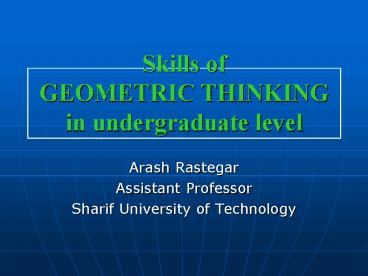Skills of GEOMETRIC THINKING in undergraduate level - PowerPoint PPT Presentation
1 / 31
Title:
Skills of GEOMETRIC THINKING in undergraduate level
Description:
We use mathematics in in solving everyday problems. ... Techno-geometer. Drawing geometric objects by computer. Algebrization of geometric structures ... – PowerPoint PPT presentation
Number of Views:73
Avg rating:3.0/5.0
Title: Skills of GEOMETRIC THINKING in undergraduate level
1
Skills of GEOMETRIC THINKINGin undergraduate
level
- Arash Rastegar
- Assistant Professor
- Sharif University of Technology
2
Perspectives towards mathematics education
- Mathematics education has an important role in
development of mental abilities. - Mathematics education is an efficient tool in
developing the culture of scientific curiosity. - We use mathematics in in solving everyday
problems. - Development of the science of mathematics and our
understanding of nature are correlated.
3
- Doing mathematics has an important role in
learning and development of mathematics. - Development of tools and Technology is correlated
with development of mathematics. - We use mathematics in studying, designing, and
evaluation of systems. - We use mathematical modeling in solving everyday
problems.
4
- Group thinking and learning is more efficient
than individual learning. - Mathematics is a web of connected ideas, concepts
and skills.
5
Mathematics education has an important role in
development of mental abilities.
- Skills of communication
- Strategies of thinking
- Critical thinking
- Logical thinking
- Creative thinking
- Imagination
- Abstract thinking
- Symbolical thinking
- Stream of thinking
6
Mathematics education is an efficient tool in
developing the culture of scientific curiosity.
- Critical character
- Accepting critical opinions
- Using available information
- Curiosity and asking good questions
- Rigorous description
- Comparison with results of other experts
- Logical assumptions
- Development of new theories
7
We use mathematics in in solving everyday
problems.
- Common mathematical structures
- Designing new problems
- Scientific judgment
- Development of mathematics to solve new problems
- Mathematical modeling
8
Development of the science of mathematics and our
understanding of nature are correlated.
- Getting ideas from nature
- Study of the nature
- Control of nature
- Nature chooses the simplest ways
9
Doing mathematics has an important role in
learning and development of mathematics.
- Logical assumptions based on experience
- Internalization
- experience does not replace rigorous arguments
- Analysis and comparison with others
10
Development of tools and Technology is correlated
with development of mathematics.
- Limitations of Technology
- Mathematical models affect technology
- Utilizing technology in education
11
We use mathematics in studying, designing, and
evaluation of systems.
- Viewing natural and social phenomena as
mathematical systems - Division of systems to subsystems
- Similarities of systems
- Summarizing in a simpler system
- Analysis of systems
- Mathematical modeling is studying the systems
- Changing existing systems
12
We use mathematical modeling in solving everyday
problems.
- Utilizing old models in similar problems
- Limitations of models
- Getting ideas from models
- finding simplest models
13
Group thinking and learning is more efficient
than individual learning.
- Problems are solved more easily in groups
- Comparing different views
- Group work develops personal abilities
- Morals of group discussion
14
Mathematics is a web of connected ideas, concepts
and skills.
- Solving a problem with different ideas
- Atlas of concepts and skills
- Webs help to discover new ideas
- Mathematics is like a tree growing both from
roots and branches
15
Geometric Thinking
16
- Geometric Imagination
- Three dimensional intuition
- Higher dimensional intuition
- Combinatorial intuition
- Creative imagination
- Abstract imagination
17
- Geometric Arguments
- Set theoretical arguments
- Local arguments
- Global arguments
- Superposition
- Algebraic coordinatization
18
- Geometric Description
- Global descriptions
- Local descriptions
- Algebraic descriptions
- Combinatorial descriptions
- More abstract descriptions
19
- Geometric Assumptions
- Local assumptions
- Global assumptions
- Algebraic assumptions
- Combinatorial assumptions
- More abstract assumptions
20
- Recognition of Geometric Structures
- Set theoretical structures
- Local structures
- Global structures
- Algebraic structures
- Combinatorial structures
21
- Mechanics (Geometric Systems)
- Material point mechanics
- Solid body mechanics
- Fluid mechanics
- Statistical mechanics
- Quantum mechanics
22
- Construction of Geometric Structures
- Set theoretical structures
- Local structures
- Global structures
- Algebraic structures
- Combinatorial structures
23
- Doing Geometry
- Algebraic calculations
- Limiting cases
- Extreme cases
- Translation between different representations
- Abstractization
24
- Techno-geometer
- Drawing geometric objects by computer
- Algebrization of geometric structures
- Performing computations by computer
- Algorithmic thinking
- Producing software fit to specific problems
25
- Geometric Modeling
- Linear modeling
- Algebraic modeling
- Exponential modeling
- Combinatorial modeling
- More abstract modeling
26
- Geometric Categories
- Topological category
- Smooth category
- Algebraic category
- Finite category
- More abstract categories
27
- Roots and Branches of Geometry
- Euclidean geometry
- Spherical and hyperbolic geometries
- Space-time geometry
- Manifold geometry
- Non-commutative geometry
28
Deep Inside Geometry
29
- Differential geometry and differentiable
manifolds - Geometric Modeling
- Classical mechanics
30
- History of mathematical concepts
31
- Number Theory
- is the queen of mathematics.
- Geometry
- is the king of number theory and mathematics!































